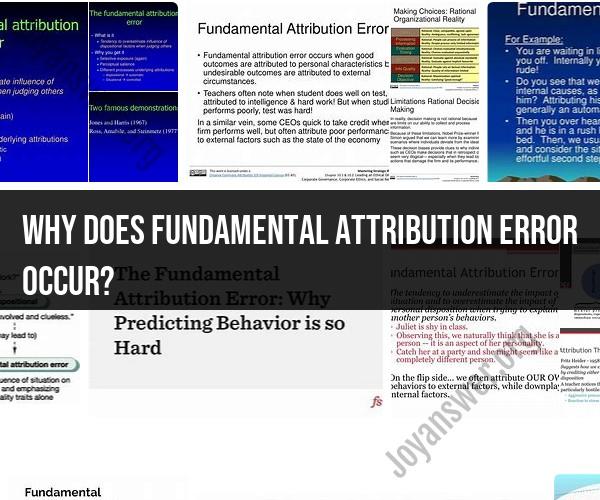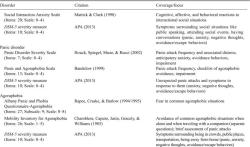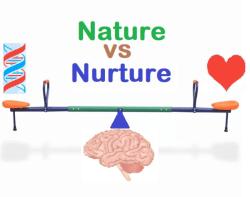Why does fundamental attribution error occur?
The fundamental attribution error (FAE) occurs due to a combination of cognitive, social, and perceptual factors that influence how individuals perceive and explain the behavior of others. It can be attributed to several underlying causes:
Perceptual Focus on Individuals: People tend to focus more on the actions and behaviors of individuals, which are readily observable, rather than on the broader context or external situational factors that might be less visible.
Cognitive Bias: The FAE is rooted in cognitive biases and heuristics, mental shortcuts that help us process information quickly. When assessing the actions of others, we often rely on the availability heuristic, which involves making judgments based on the most readily available information, typically the person's behavior.
Attribution Process: Humans have a natural tendency to seek explanations for the actions of others. In the absence of complete information, we resort to making attributions, which are often influenced by our preexisting beliefs and stereotypes.
Personality-Centric Perspective: We generally believe that behavior is a reflection of a person's character, values, or disposition. This perspective can overshadow situational influences, as we are inclined to give more weight to internal attributions (personality factors) over external attributions (situational factors).
Lack of Access to Information: We often lack complete information about the situational factors affecting another person's behavior. Without a clear understanding of these external influences, we are more likely to rely on internal attributions.
Confirmation Bias: Once we form an initial attribution about a person's behavior, we tend to seek information that confirms our initial belief while discounting contradictory evidence. This confirmation bias can reinforce the FAE.
Cultural and Social Factors: Cultural norms and social context play a role in shaping our attributions. In individualistic cultures, where individual achievement and personal responsibility are emphasized, people may be more prone to the FAE.
Motivational Factors: Sometimes, people may have motivations to protect their own self-esteem or justify their beliefs. Attributing negative behaviors to a person's character can, in some cases, serve as a way to distance oneself from the same behavior.
Observer's Perspective: The FAE is more likely to occur when we are observing others from an external perspective. When we are in the same situation ourselves, we are more inclined to consider situational factors that influence behavior.
Emotional and Moral Judgment: When we make moral judgments or have strong emotional reactions to someone's actions, we may be more likely to attribute those actions to the person's character and not adequately consider the situational factors.
Understanding the underlying causes of the FAE is essential for improving our ability to make more accurate and empathetic judgments about the behavior of others. Recognizing that this bias exists and consciously considering situational factors can help reduce its impact in our everyday interactions.
The Psychological Mechanisms Behind Fundamental Attribution Error
The fundamental attribution error (FAE) is a cognitive bias in which we tend to overestimate the influence of dispositional factors (such as personality traits) and underestimate the influence of situational factors (such as the environment) when explaining the behavior of others.
There are a number of psychological mechanisms that have been proposed to underlie the FAE. One mechanism is that we tend to focus on the actor's behavior when explaining their behavior, and we ignore the situational factors that may be influencing their behavior. This is because the actor's behavior is more salient and easier to observe than the situational factors.
Another mechanism is that we tend to make inferences about people based on their behavior. This tendency is known as the correspondence bias. The correspondence bias can lead us to overestimate the influence of dispositional factors and underestimate the influence of situational factors.
Exploring the Causes of Fundamental Attribution Error
There are a number of factors that can contribute to the FAE, including:
- Cognitive biases: Cognitive biases are mental shortcuts that we use to make decisions and judgments. However, these shortcuts can lead to errors in thinking. For example, the correspondence bias can lead us to overestimate the influence of dispositional factors and underestimate the influence of situational factors.
- Perceptual salience: Perceptual salience refers to how noticeable something is. The actor's behavior is more salient and easier to observe than the situational factors that may be influencing their behavior. This can lead us to focus more on the actor's behavior and less on the situational factors when explaining their behavior.
- Socialization: We are socialized to believe that people's behavior is a reflection of their personality traits. This belief can lead us to overestimate the influence of dispositional factors and underestimate the influence of situational factors.
Why Do Humans Tend to Make Attribution Errors?
Humans tend to make attribution errors for a number of reasons, including:
- Cognitive biases: Cognitive biases are mental shortcuts that we use to make decisions and judgments. However, these shortcuts can lead to errors in thinking.
- Perceptual salience: Perceptual salience refers to how noticeable something is. The actor's behavior is more salient and easier to observe than the situational factors that may be influencing their behavior. This can lead us to focus more on the actor's behavior and less on the situational factors when explaining their behavior.
- Socialization: We are socialized to believe that people's behavior is a reflection of their personality traits. This belief can lead us to overestimate the influence of dispositional factors and underestimate the influence of situational factors.
- Motivation: We may be motivated to make attribution errors in order to maintain our self-esteem or to protect our beliefs about the world. For example, if we see someone doing something bad, we may be motivated to blame their behavior on their personality traits (e.g., they are a bad person) rather than on the situational factors (e.g., they were having a bad day).
The Connection Between FAE and Stereotyping
The FAE can lead to stereotyping because it can cause us to make inaccurate judgments about people based on their group affiliation. For example, if we believe that all members of a certain group are lazy, we may be more likely to attribute their behavior to their laziness, even if the situation could explain their behavior.
Stereotyping can also contribute to the FAE. For example, if we stereotype a certain group as being lazy, we may be more likely to attribute their behavior to their laziness, even if the situation could explain their behavior.
Strategies to Mitigate Fundamental Attribution Error in Thinking
There are a number of strategies that we can use to mitigate the FAE in our thinking, including:
- Be aware of the FAE: The first step to mitigating the FAE is to be aware of it. Once we are aware of the FAE, we can be more mindful of our thinking and try to avoid making attribution errors.
- Consider the situational factors: When explaining someone's behavior, it is important to consider the situational factors that may be influencing their behavior. For example, if we see someone being rude to a waiter, we should consider that they may be having a bad day or that they are stressed out about work.
- Be mindful of our own biases: We all have biases, but it is important to be mindful of them so that they do not cloud our judgment. We can be more mindful of our biases by paying attention to our thoughts and feelings and by asking ourselves why we believe what we believe.
- Seek out information from diverse sources: When we are trying to understand someone's behavior, it is important to seek out information from diverse sources. This will help us to get a more complete picture of the situation













